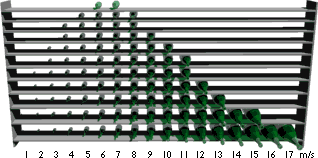Mean (Average) Power of the Wind
![]()
Balancing
the Power Distribution
The reason why we care about wind speeds is their energy content,
just like with the bottles on the previous page: We cared about
their content in terms of volume. Now, the volume of a bottle
varies with the cube of the size, just like wind power varies
with the cube of the wind speed.

Let us take the Weibull distribution of wind speeds, and for
each speed we place a bottle on a shelf each time we have a 1
per cent probability of getting that wind speed. The size of
each bottle corresponds to the wind speed, so the weight of each
bottle corresponds to the amount of energy in the wind.
![]() To the right, at 17 m/s we have some really
heavy bottles, which weigh almost 5000 times as much as the bottles
at 1 m/s. (At 1 m/s the wind has a power of 0.61 W/m2.
At 17 m/s its power is 3009 W/m2).
To the right, at 17 m/s we have some really
heavy bottles, which weigh almost 5000 times as much as the bottles
at 1 m/s. (At 1 m/s the wind has a power of 0.61 W/m2.
At 17 m/s its power is 3009 W/m2).
![]() Finding the wind speed at which we get the
mean of the power distribution is equivalent to balancing
the bookshelves. (Remember how we did the balancing act on the
Weibull distribution page?).
In this case, as you can see, although high winds are rare, they
weigh in with a lot of energy.
Finding the wind speed at which we get the
mean of the power distribution is equivalent to balancing
the bookshelves. (Remember how we did the balancing act on the
Weibull distribution page?).
In this case, as you can see, although high winds are rare, they
weigh in with a lot of energy.
![]() So, in this case with an average wind speed
of 7 m/s, the power weighted average of wind speeds is
8.7 m/s. At that wind speed the power of the wind is 402 W/m2,
which is almost twice as much as we figured out in our naive
calculation on the top of the previous page.
So, in this case with an average wind speed
of 7 m/s, the power weighted average of wind speeds is
8.7 m/s. At that wind speed the power of the wind is 402 W/m2,
which is almost twice as much as we figured out in our naive
calculation on the top of the previous page.
![]() On the next pages we will use a more convenient
method of finding the power in the wind than hauling bottles
around...
On the next pages we will use a more convenient
method of finding the power in the wind than hauling bottles
around...
![]()
|
Back | Home
| Forward |
© Copyright 2000 Soren Krohn.
All rights reserved.
Updated 9 September 2000
http://www.windpower.org/tour/wres/shelves.htm